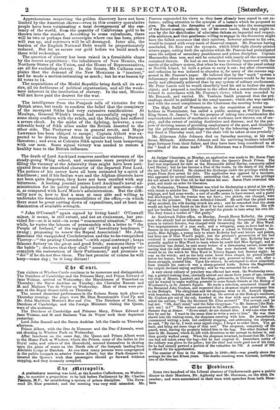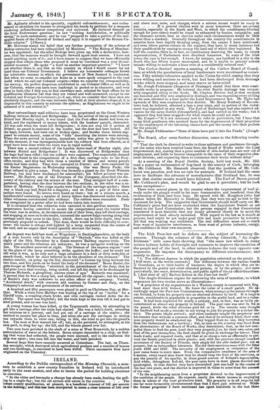Vtbt Vreb hues.
Some two hundred of the Liberal electors of Cockermouth gave a public dinner to their Members, Mr. Aglionby and MT. Horstnan, on the 29th re camber; and were entertained in their turn with speeches from both Mem- bers. Mr. Aglionby alluded to his specialty, copyhold enfranchisement; and endea- voured to stimulate his hearers to strengthen his hands by petitions for a measure rendering enfranchisement compulsory and universal. He declared himself on the Irish Endowment question: he saw "nothing Antichristian, or politically wrong," in such endowment; and he was "prepared to take a portion of the mis- applied funds of the Church of Ireland and apply it in support of the Roman Ca- tholic religion." (Cheers.) Mr. Horsman stated his belief that any further prosecution of the scheme of Bishop-extension had been relinquished by Ministers. "The Bishop of Manches- ter was appointed; but the other Bishops were given up, with a declaration, how- ever, that the measure would be brought forward again next session. I have not heard anything more of it; and I have reason to suppose that we have effectually stopped that which those who proposed it must be convinced was a very ill-con- sidered measure." He spoke "a word on another important question." "I know not whether there is any blot on this country on which I would sooner lay my hand than our Colonial Government. I believe my honourable colleague knows the admirable manner in which the government of New Zealand is conducted. But when we come to consider our home as a mere speck compared to the vast world which we call our Colonial empire—when we consider the irresponsibility, the secrecy, the perfect despotism established in our Colonial Office as well as in our Colonies where you have men bankrupt in pocket or in character, and very often in both, (for I defy you to find elsewhere men selected for high offices for no qualification whatever bat that they are rained and well-connected, except in our Colonial and Foreign Governments,)—I say, when we consider that these men are absolutely despotic, and the vast interests they hold at their absolute disposal, it is disgraceful in this country to tolerate the system; as Englishmen we ought to be ashamed of it and reform it."
Most extraordinary mail robberies have been perpetrated on the Great Western Railway between Bristol and Bridgewater. On the arrival of the up mail- train at Bristol last Monday night, it was found that the Post-office tender had been en- tered, and the registered or money letters, with the bankers' parcels, abstracted. All was safe when the train left Bridgewater; it does not stop till it arrives at Bristol; HO guard is stationed in the tender, but the door had been locked. All the bags, however, had been cut or broken open; and besides those letters sup- posed to contain money, some of the "bills " describing the letters were missing. When the news arrived in London, immediate notice was given to the bankers. At the moment, it was incomprehensible how the robbery had been effected, as it must have been done while the train was in rapid motion. There was a second robbery of the London down-mail of Monday night, also between Bristol and Bridgewater I It was discovered at Bridgewater that the bags bad been rifled ; but the robbers were captured. Two respectably-dressed men were found in the compartment of a first-class carriage next to the Post- office tender, and they had with them a number of letters and money parcels which had been stolen. They were conveyed to Exeter; and were examined by the Exeter Magistrates on Wednesday morning. One was Henry Poole; the other refused to give a name. Poole was formerly a guard on the Great Western Railway, but had been discharged for misconduct; his fellow prisoner was un- known. Mr. Barlow, one of the Directors of the Company, described the dis- covery of the robbery and the seizure of the men. They occupied half of a com- ment, having shut the door between the two sections; in the other was a so- licitor of Modbury. Two crape masks were found in the carriage-pocket ; there was a black cap well fitted for a disguise; and on Poole a pair of false mus- tachios were found. No letters were found on them ; but on a minute search, a handkerchief containing a number of heavy letters was discovered under the seat. Other witnesses corroborated this evidence. The robbers were remanded. Poole was recognized by a porter after he had been taken into custody.
It is surmised that the robberies were executed in this perilous manner. The perpetrators having contrived to secure the compartment next the tender when the train was in motion, at the imminent risk of thew lives, they left their carriage, and stepping at once on to the tender, traversed the narrow ledge running along that carriage until they came to the door; whioh, there can be little doubt, they were previously prepared to unlock. This done, there would be little difficulty to over- come: the tender is always well lighted by a lamp suspended from the centre of the roof, and an expert thief would speedily abstract the booty.
An inquest was held last week at Wraysbury, in Buckinghamshire, on the body of a man known only by the description of " Shylock," who was killed on the night of the 26th December by a South-western Railway express-train. The man's name and his relations are unknown; he was a navigator working on the line. The accident occurred at night. The fireman of the express engine "saw by the glare of the lamp something strike against the buffer; and he could not tell what it was, as he only saw a large substance in a dark or dirty moleskin or smock-frock, which he since believed to be the shoulders of the deceased." The station-master, on going up the line, discovered "a human leg lying between the two lines, and five yards on he found the body of the deceased." Moses Butler, the gate-keeper at Willybridge. "admitted, to the astonishment of the Jury, that he had gone home that evening, being: unwell, and left his duties to be discharged by Thomas Richards, a ploughboy, sixteen years of age." Richards was examined: it proved that he was a sharp lad, and understood all the signals; but his taking of Butler's duty was unknown to any other officer of the company. Verdict, "Accidental death," with censures and cautions by Coroner and Jury, on the Company's selection and government of its servants.
A hundred and fifty passengers were placed in peril on Christmas Day, at Mer- thyr. While a train from Merthyr was waiting at the top of an "incline" for a Cardiff train, a coupling-chain broke, and nine carriages rushed down the de- clivity. The speed was frightful ; but the train kept to the iron till it had got to level ground, and no one was hurt.
A young woman has been killed, at the Teignmouth station, by attempting to get into a carriage after the train had started. She was a lady's-maid, attending her mistress on a journey, and had got out of a carriage at the station ; she omitted to resume her place in time, and when she saw the carriages in motion ran towards them to enter one; failing in this, she tried to get into the guard's box. The man at first warned her off; but, as she persisted, he attempted, at his own peril, to drag her up: she fell, and the wheels passed over her.
Two men have perished in the shaft of a mine at West Bromwich, by a sudden accumulation of water at the bottom. Seven miners descended in a skip; on find- ing that water had collected, the people were alarmed, and in the confusion the skip was upset ; two men fell into the water, and both perished.
Several large fires have recently occurred at Cottenham. The last, on Thurs- day sennight, whioh destroyed much agricultural produce and a number of houses and out-buildings, iv surmised to have been wilful. Three successive fires have originated on the Thursday.































 Previous page
Previous page